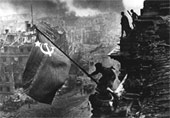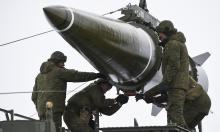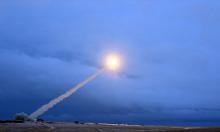USSR still considered scapegoat in winning WWII
In Western journalism, Soviet soldiers are portrayed as looters and barbarians during WWII

A little bit more than six months are left before the celebration of the 60th anniversary since the collapse of the Nazi empire. Dozens of countries all over the world will hold festive arrangements devoted to it. May 9th remains an important day for the countries of the former Soviet Union too. A war is always a tragedy, but WWII became an enormous tragedy for the USSR. There can not be another example found in history, when tens of millions of people died in one country only, as it happened in the Soviet Union during WWII. 
Politics, however, still interferes in recollections of that horrible period even 60 years afterwards. Western newspapers and magazines have published quite a lot of articles during the recent two years about the “atrocities” of the Soviet Army in Germany. The last one of them can be found in the British press. The article, published in the Daily Mail on October 20, was titled “Barbarians.” There is no need to explain, whom exactly the headline of the article designated.
One may also recollect the events, which took place two months ago, during the celebration of the Warsaw Uprising. Poland demanded Russia should apologize for the soviet Army's inaction to help the insurgents.
Who gains the profit from describing the Soviet soldiers as looters, savages, barbarians, etc, instead of calling them the liberators, who saved a half of Europe from gas chambers? It is noteworthy that articles written by Western journalists and historians are abundant in misinterpretation of facts. Below you can find some examples of it.
Having signed the non-aggression pact with Germany, the Soviet Union virtually became involved in Hitler's expansion
The pact was signed indeed. The Soviet troops occupied the territory of the Baltic states, western Ukraine and Belarus. However, one should recollect the events, which took place a year before that in Munich, when Great Britain and France gave Czechoslovakia away to Hitler. Then Polish government rushed to join the distribution of its southern ally and took the Tishin area. Hungary, the Nazi ally, also snatched at several areas, which used to be a part of Czechoslovakia. Poland's western allies did not raise a finger to assist the country after the incursion of the Nazi troops. Polish officials are not willing to talk about it, for some reason.
The outrage of Soviet troops in Germany
This is one of the most favorite WWII subjects to talk about for Western media. The description of the storm of Koenigsberg, for example, is accompanied with a story about the Soviet soldiers exterminating the civil population of the city. Why not mentioning the well-known fact of the US and British bombing of Dresden in February of 1945, two months before the storming of the capital of East Prussia, when 135,000 people were killed? Unlike Koenigsberg, Dresden did not have a special military significance. The leveling of the city was nothing but a deterrent, as it subsequently happened with the bombing of Hiroshima and Nagasaki.
It goes about well-known facts here. One does not have to spend many hours digging the archives – it is enough to look through a couple of books on World War II history. To all appearance, the tales about the outrage of the Soviet warriors are much more fascinating rather than the objective description of events. Germans are often portrayed as war victims in those stories. A person ignorant in history might think after reading such tales that Stalin's horde invaded peaceful Germany to satisfy their need for violence and looting. Western journalists do write about Germans' activities on occupied territories on certain occasions, although they do not pay much attention to it. They do not write stories how Soviet soldiers found a village that Nazi troops burned to the ground with all of its residents. No one has ever tried to count the number of such villages and towns.
It is hard to say, if there are certain guidelines to write about WWII events on the threshold of the 60th anniversary of the Victory Day. Probably, it is the matter of bringing more entertainment to readers, who usually buy into horror stories. At any rate, such articles justify the Nazi incursion in the USSR. It may also exemplify Hitler's old thesis about the protection of Europe from “eastern savages.” The sufferings of a certain European state (even Germany) pale in comparison with the yearning that citizens of the former Soviet Union had to go through during WWII.
Subscribe to Pravda.Ru Telegram channel, Facebook, RSS!





